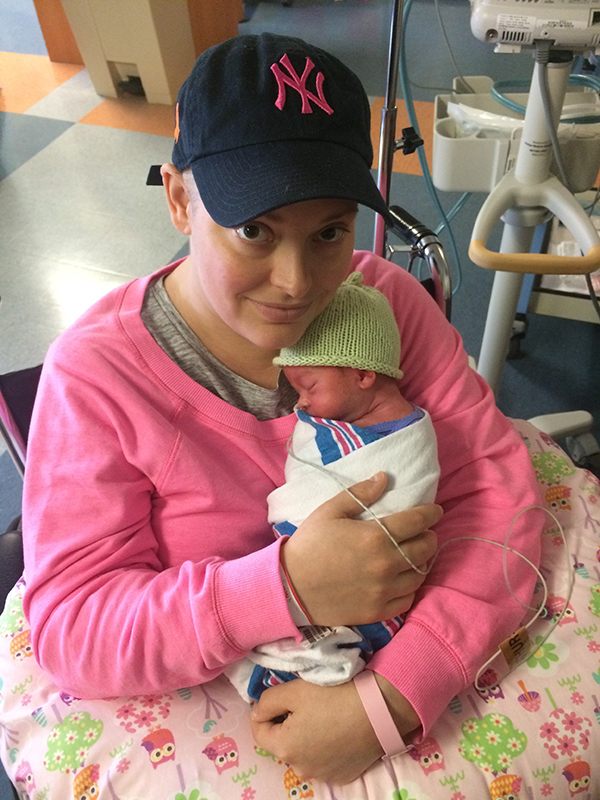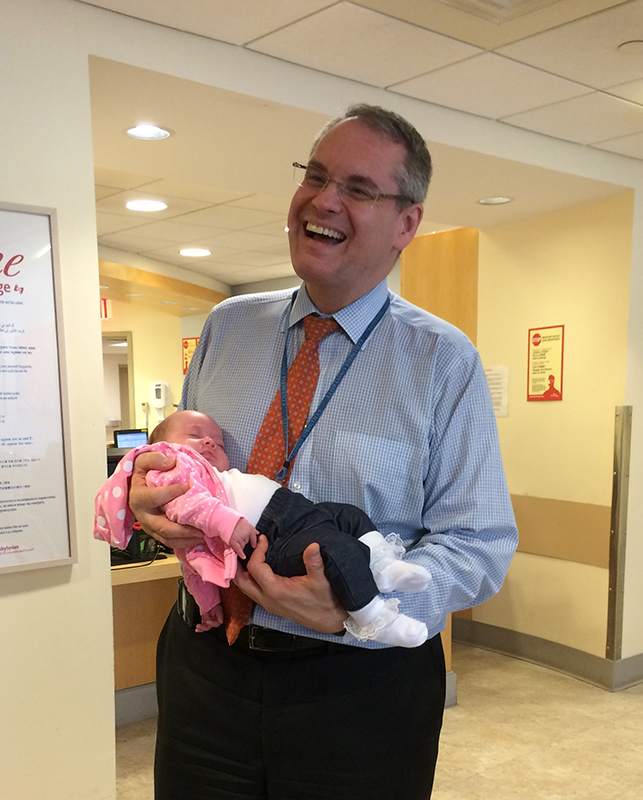‘Two Lives to Worry About’: A Pregnant Mom Learned She Had Leukemia
Days after she found out she was going to have a baby girl, Kristin McKinley was told she had cancer. Her team of doctors immediately got to work to save her — and her baby.

It should have been the happiest time in Kristin McKinley’s life. In April 2016, she was four months pregnant with her first child. She and her husband, Ryan, had just learned she would be having a girl. But a few days later that happy news was overshadowed by a shocking diagnosis of acute myeloid leukemia (AML), a rare and devastating disease that, in Kristin’s case, was made even more complicated by her pregnancy.
“Monday was the best day ever,” Kristin, 28 years old at the time, recalls. “We found out we were having a girl. Friday, I was told I had cancer.”
Until that point, there had been no concerns about Kristin’s health.
But when she was sent to a high-risk OB-GYN to check an unrelated condition called bicornuate (heart-shaped) uterus, “He asked me about my energy and do I get out of breath, and I’m like, ‘Well, yeah. Kind of.’ I guess something piqued his interest.”
In fact, the doctor was concerned enough to order a battery of tests. When Kristin received the AML diagnosis a few days later, she was stunned.
“When they first told me that I might have leukemia, I didn’t even know what leukemia was,” she says. “As soon as the doctor left, I Googled it and found out it was cancer. I almost threw up. It was devastating.”
Kristin, a violinist and Ph.D. candidate studying music and education, had already decided she’d leave her doctoral program in Florida so she and Ryan could return home to New York to start their family. Suddenly, their top priority was finding cancer treatment. Within a week of her diagnosis, they would be back in New York.
“I flew home Tuesday,” she recalls, “and I was in Dr. Jurcic’s office Wednesday morning.”
Dr. Joseph G. Jurcic, director of the Hematologic Malignancies Section in the Division of Hematology/Oncology at NewYork-Presbyterian/Columbia University Irving Medical Center, worked with a multidisciplinary, collaborative team that immediately came together so Kristin could quickly begin treatment.
“Leukemia is a very aggressive disease,” says Dr. Jurcic, a professor of medicine at Columbia University Vagelos College of Physicians and Surgeons. “If it’s not treated promptly, people will have severe infections and, without treatment, most people with AML can only live about three to six months — at most.”
Kristin recalls that from the moment she arrived, her team was at the ready, and these relationships just “snowballed.”
“It was so heartwarming,” she says. “Dr. Jurcic explained everything and said, ‘We’re going to save you and we’re going to save your baby.’”
Taking Immediate Action
Approximately 20,000 cases of AML are diagnosed each year in the United States. The number of women diagnosed with leukemia while pregnant is even more rare.
For Kristin’s team, their work was exponentially more difficult — treating AML is challenging enough, but treating a pregnant woman with AML is far more complicated.
“It’s always humbling and daunting to treat this disease because so much can happen,” says Dr. Jurcic. “There are so many variables, and even if you do everything right, it doesn’t guarantee a perfect outcome. And treating Kristin, we had two lives to worry about.”
AML starts in the bone marrow but often moves quickly into the blood, which is why immediate treatment is important. The team decided to give Kristin a round of chemotherapy, deliver the baby by C-section at 31 weeks, then give Kristin a second round of chemotherapy after the birth.
As Dr. Jurcic readied Kristin for her first round chemotherapy, she asked to delay it until after the birth of her daughter. He told her that wasn’t possible.
“‘You have to do chemo while you’re pregnant,’” Kristin recalls him saying. “He had to tell it to me the hard way. He said, ‘If you don’t do it, you won’t be here.’”
Kristin began chemotherapy in late April 2016, which required staying in the hospital for 37 days. For the first seven, she received a continuous stream of drugs via an IV.
“The medications that we gave her, the chemotherapy drugs, have been around for a long time,” Dr. Jurcic says. “And that gives us some confidence because these drugs have been used in pregnant people before and it’s been safe. Sometimes, our oldest tools are still our best.”
Dr. Dorothy Smok, a maternal fetal medicine specialist at NewYork-Presbyterian/Columbia and a clinical assistant professor of obstetrics and gynecology at Columbia University Vagelos College of Physicians and Surgeons, worked closely with Dr. Jurcic and Kristin’s team.

Kristin with Emma in the NICU.
“In pregnancy, we’ve learned that chemotherapy is generally well tolerated by the fetus,” says Dr. Smok. “We have competing interests when caring for both the mother and her developing baby; what’s good for one may not be good for the other. Delaying treatment can be dangerous for the mother, and even though there are fetal risks, it’s good to know that a good outcome for both can be achieved when chemotherapy must be started in pregnancy.”
Kristin’s initial round of chemo got off to a rocky start.
“The first day, my husband and I were playing Yahtzee,” she recalls, “and we forgot a pencil, so I stood up to get one and my legs started shaking and my whole body started convulsing. I had no control. It was at change of shift, and there were a million nurses around me. Dr. (Todd) Rosenblat (a hematologist/oncologist) scooped me up like Superman. I’ve never seen a team come together like that. Everybody sprang into action.”
A couple of days later, they resumed Kristin’s lengthy inpatient chemotherapy treatment.
“Dr. Rosenblat likes to call it ‘leukemia jail,’” Kristin recalls. “You’re stuck there. It could be for a month because they deplete your entire immune system and then it has to come back. So you can’t really be out in public.”
Kristin completed that first round in late May, and she had some time off from treatment along with something to look forward to — her daughter was scheduled to be delivered June 18.
“Ideally, we try to get the pregnancy as far along as possible, but the decision of when to deliver will depend on maternal health, the aggressiveness of the cancer, and the time from the last round of chemotherapy,” says Dr. Smok. “We try to defer delivery for three weeks from the last dose of chemotherapy to allow the fetal effects to wear off.”
I am alive because of these people. I know I am. They were just amazing. They bent over backward to help us. It was so special.
Kristin McKinley
A Safe Delivery, but Complications Continue
Emma was born weighing 3 pounds, 11 ounces at 31 weeks, a day earlier than planned, because Kristin was experiencing high blood pressure and her platelet count was dropping.
“She was perfect,” Kristin says.
Two weeks later, on July 5, Kristin went back to the hospital to receive her second round of chemotherapy while Emma stayed in the neonatal intensive care unit (NICU).
“My husband would push me in the wheelchair over to the NICU, and we would stay and hold her all day,” Kristin says.
Soon, Kristin finished the second round of chemo. But after just one night at home, she rushed back to the hospital with profuse bleeding that required 40 transfusions in one week alone.
“The chemotherapy that we give is quite strong and it kills all of the leukemia cells in the bone marrow, but it also kills the good cells,” Dr. Jurcic explains, “and so for a period of time the patient is unable to produce blood cells. So they need red blood cell and platelet transfusions, essentially doing the work of the normal bone marrow while we’re waiting for it to recover.”
The worst part about being in the hospital was being unable to see Emma, who had been released from the NICU in mid-July — a month after her birth — and wasn’t permitted to be with Kristin because of the bleeding.
“All I wanted to do was to see my baby. And I would scream and cry that I couldn’t see her,” Kristin says. “It was just really, really hard being in the hospital away from my baby.”
Incredibly, a physician assistant from the Leukemia team lent Kristin’s family her nearby apartment so they wouldn’t have to commute from Long Island to visit her. “She was an angel,” Kristin says.
‘The Best Chance Possible’
Now that the chemo was over, it was time for Kristin to receive a bone marrow transplant, which infuses healthy blood stem cells into the body to replace damaged or diseased bone marrow.
Unlike many patients undergoing the procedure, “I didn’t have a perfect match,” she says of her challenging search for a donor. “There was none on the registry for me, and my brother wound up being a half match. So that’s what we went with.”

Kristin, Ryan, and Emma after Kristin’s bone marrow transplant.
Although she had known she would need a bone marrow transplant, the reality of her situation was difficult to take. The procedure often requires a long and difficult recovery.
“I thought that was it for me,” Kristin says of the procedure. “I kept equating it to running a marathon, but you never stop to sleep. You haven’t trained for it. … I was getting kicked down again and then kicked down again, and I was depleted.”
In August 2016, when Emma was 2 months old, Kristin underwent the bone marrow transplant, led by Dr. Ran Reshef, director of translational research in the Blood and Marrow Transplantation Program at NewYork-Presbyterian/Columbia.
“It is hard to even describe the difficulties in performing a bone marrow transplant in the mother of a 2-month-old baby,” Dr. Reshef says. “Not only are there unique medical concerns, but there’s also the tremendous emotional challenge of spending more than a month in the hospital, feeling sick, and not being able to be with your newborn baby.”
The transplant was a success, but Kristin’s recovery took time.
“It was miserable,” Kristin recalls. “I couldn’t do anything. I just sat on a couch all day and had to do at-home infusions of magnesium and hydration. I still had an IV that I would do myself. I was very weak and tired all the time. I couldn’t be home alone with the baby. I had somebody with me 24 hours. … After a year, I got a little more strength, but even after the second year … I don’t think I’ll ever have that strength that I used to have.”
Getting Back to Normal
Now, more than three years since Kristin’s AML diagnosis, she remains cancer-free, thanks to her team of doctors, nurses, and physician assistants, and her resilience.
“There were a lot of people coming together,” says Dr. Jurcic. “It really does take a village.”
“I am alive because of these people,” Kristin says. “I know I am. They were just amazing. They bent over backward to help us. It was so special.”
Dr. Rosenblat, the “Superman” who had scooped up Kristin when she collapsed during Yahtzee, says he can’t imagine the level of care she received being possible anywhere else.
“The degree of multidisciplinary care that was delivered was amazing,” he says. “This involved coordination between Leukemia, Bone Marrow Transplant, Pediatrics, and Maternal Fetal Medicine as well as our physician assistants, nurses, pharmacy, blood bank, and many others. I don’t think this could have happened at many other centers in the country.”
Emma, now 3 years old, loves dancing, coloring, singing, and having her mother push her on a swing. After a multi-year hiatus while she was sick, Kristin started playing the violin again and joined a community orchestra.

Dr. Jurcic and Emma.
Dr. Jurcic remains impressed with Kristin’s outlook and approach to treatment — and life.
“She was sort of the perfect patient,” he says. “She did everything just as she should, and it’s that kind of partnership with the patient that’s absolutely crucial for a good outcome.”
In celebration of Emma’s first birthday, Kristin invited members of her NewYork-Presbyterian/Columbia team to her home on Long Island. Many attended and, Dr. Jurcic, who was unable to join, sent a piggy bank from Tiffany & Co. as a gift, which Emma keeps on a shelf in her room.
“I thought it would be something that they could enjoy as a real keepsake,” he says.
“Kristin remains a special patient to us,” adds Dr. Reshef, Kristin’s bone marrow transplant physician. “Our entire team gets birthday and holiday photos and is proud to see Emma growing up to be a beautiful healthy girl.”
Today, Kristin is happy to be home with her family. Although she can’t have more children — the result of early menopause after the bone marrow transplant — she is profoundly grateful to have Emma. One day, Kristin says, she will tell Emma the whole story.
“I have a little book and I’ll probably start with reading her some of it,” she says. “She has seen some pictures and she’s seen the IVs and she’s like, ‘Mommy has a boo-boo.’ And I just say, ‘Yeah, Mommy was really sick.’ That was the first time I ever shared what I went through. But she saved me. There is no way I would have known I was sick if I weren’t pregnant and seeing the doctor. She was here to save me.”
Additional Resources
Learn more about NewYork-Presbyterian’s leukemia and bone marrow transplant programs.
Read about the Mothers Center for pregnant women with complex conditions.
